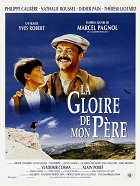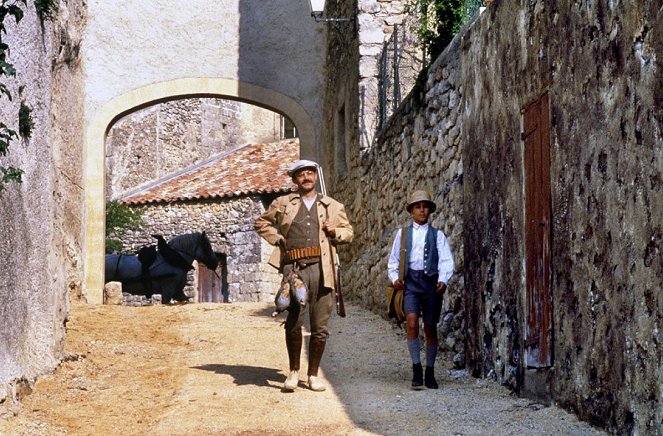Rendező:
Yves RobertZeneszerző:
Vladimir CosmaSzereplők:
Philippe Caubère, Nathalie Roussel, Didier Pain, Thérèse Liotard, Julien Ciamaca, Victorien Delmare, Joris Molinas, Benoît Martin, Paul Crauchet (több)Tartalmak(1)
Set in Provencal in the late 19th and early 20th centuries, the film first introduces members of the family, including Marcel (Julien Ciamaca). When he is still a preschooler, his father Joseph, a teacher, takes him to classes to watch over him. Marcel, however, learns along with the other children and starts to read out loud in class. Astonished, Joseph (Philippe Caubère) writes a sentence on the blackboard and asks, "What does that say?" Marcel, reading the words, says, "The father is proud of his little boy." This little scene establishes the tone and meaning of the film. Flashing ahead seven years, the camera then follows the Pagnols after they leave Marseilles for a summer vacation in the Provencal countryside, there to bask in the simplicity of rural life. From then on, it is not what happens to the family that engages audiences; it is how it happens -- with a quiet exuberance and joie de vivre. Besides Marcel and his father, the vacationers include his mother, Augustine (Nathalie Roussel), a beautiful and kindly homemaker; Marcel's little brother Paul (Victorien Delamare); and his Uncle Jules (Didier Pain) and Aunt Rose (Thérèse Liotard). After they arrive at their cottage, 11-year-old Marcel wastes no time wading into the greenery in search of adventure. What he finds is another adventuresome boy, Lili de Bellons (Joris Molinas), a native of the region. They become friends and fellow explorers, capturing cicadas, climbing rocks, and even invading an eagle's cave. Sometimes they just have fun shouting to hear an echo boomeranging back. At meal times -- often outdoors -- fresh fruit and good-natured repartee satisfy appetites. For spectator sport, the diners listen to the occasional religious arguments between Uncle Jules, a God-fearing Catholic, and Joseph, a God-doubting agnostic. Augustine and Aunt Rose avoid the polemics, for they have more important matters on their minds: keeping house, watching children, and planning the next day's menu. And then the film takes a turn toward real drama. Uncle Jules, full of tales about his prowess as a hunter, persuades Joseph, full of ignorance about guns and hunting, to go on a bird hunt. Woe is Papa, Marcel thinks. When the day of the great hunt arrives, Marcel secretly follows Joseph and Uncle Jules into the woods, setting the stage for the film's climactic moment. (forgalmazó hivatalos szövege)
(több)Recenziók (3)
Provence, which was the inspiration for Pagnol's work, in a movie about childhood based on the first part of Pagnol's famous memoirs. The basics of his work are clearly recognizable here, and moreover, the whole thing unfolds with the appealing spirit of an innocent carefree child's view of the world, which reminds us more than once of “Le Petit Nicholas" (even in specific details); so much so that I wondered if Goscinny had in fact been inspired by Pagnol.
()
This wonderful trip back to the times at the turn of the 19th and 20th century in the French countryside, seen through the carefree lens of a child and served up with the right amount of humor by the wry voice of Viktor Preiss, is bound to enchant any receptive soul. The beautiful hilly landscape of Provence enhances the poetry of the whole narrative in a way that makes you want to scream: "God, how beautiful the world is!" (85%)
()
This is an extremely pleasant French, essentially family film about the book author's childhood in the French countryside. It's extremely calm, it's not unnecessarily exacerbated, and it shows both the purity of a child's soul and the beautiful landscape of the French countryside. I'd take that kind of childhood too, not that mine was bad.
()


Hirdetés